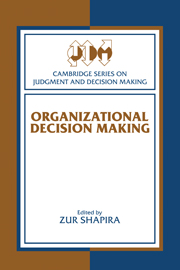Book contents
- Frontmatter
- Contents
- Series preface
- List of contributors
- Editor's preface
- Part I Introduction
- Part II Information processing and attention allocation
- Part III Preference processing
- Part IV Decision processes
- Part V Alternative approaches
- 13 Naturalistic decision making and the new organizational context
- 14 Telling decisions: The role of narrative in organizational decision making
- 15 Bounded rationality, indeterminacy, and the managerial theory of the firm
- 16 The scarecrow's search: A cognitive psychologist's perspective on organizational decision making
- Name index
- Subject index
15 - Bounded rationality, indeterminacy, and the managerial theory of the firm
Published online by Cambridge University Press: 06 August 2010
- Frontmatter
- Contents
- Series preface
- List of contributors
- Editor's preface
- Part I Introduction
- Part II Information processing and attention allocation
- Part III Preference processing
- Part IV Decision processes
- Part V Alternative approaches
- 13 Naturalistic decision making and the new organizational context
- 14 Telling decisions: The role of narrative in organizational decision making
- 15 Bounded rationality, indeterminacy, and the managerial theory of the firm
- 16 The scarecrow's search: A cognitive psychologist's perspective on organizational decision making
- Name index
- Subject index
Summary
Introduction
This chapter is my response to a request for an account of “an economist's perspective on the organization of the firm.” “When faced with this request, I had three initial reactions. First, Oliver Hart had already written an interesting article (1989) with the same title, which, while presenting his own original point of view, also presented an excellent overview of the current ideas of economists on the subject. Second, my own perspective is probably more idiosyncratic than representative of the “generic economist,” even though it is derived from such respectable authors as Arrow, Simon, Cyert, and March. Third, the subject is too vast for the confines of a short essay.
With these thoughts in mind, I decided to focus on two issues that have become increasingly apparent in attempts to apply the prevailing notions of “economic rationality” to the theory of the organization of business firms. The first goes under the rubric of bounded rationality. This is hardly a new idea, and has been forcefully brought to our attention in the work of Simon and others, although awareness of the problem (in economics) goes back at least to J. M. Clark (1918). I shall try to provide a more detailed taxonomy of bounded rationality than is usually done. In particular, it is important to distinguish between (1) costly rationality, like the costs of observation, communication, and even computation, that require only an extension of the standard Savage Paradigm and (2) truly bounded rationality, like not knowing the implications of everything that one knows, which – as far as I know – goes far beyond the Savage paradigm.
- Type
- Chapter
- Information
- Organizational Decision Making , pp. 324 - 352Publisher: Cambridge University PressPrint publication year: 1996
- 2
- Cited by

